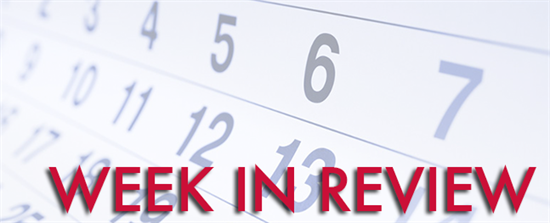WEEK IN REVIEW
Washington,
September 18, 2015
|
Staff
Dodd-Frank's Impact 5 Years Later: We Are Less Free
As the nation marked Constitution Day on Thursday, the Financial Services Committee heard from witnesses that the Dodd-Frank Act makes Americans less free. By centralizing greater power in the hands of Washington bureaucrats, Dodd-Frank results in a less dynamic economy and a command-and-control system in which regulators dictate credit offerings and individual freedom and choice are sacrificed. "Dodd-Frank erodes the economic freedom and opportunity that empowers low income Americans to rise and generate greater shared prosperity. Dodd-Frank moves us away from the equal protection offered by the impartial rule of law towards the unequal and victimizing rule of political bureaucrats. Of all the harm Dodd-Frank inflicts, this is the most profound and disturbing" Chairman Jeb Hensarling (R-TX) said. Rep. Robert Hurt (R-VA) said he’s heard from his constituents about the impact Dodd-Frank is having on their lives. “Constituents told me that while this law was touted as Washington’s attempt to protect consumers, in reality it has only left consumers with fewer choices and higher costs to access capital,” he said. “In giving even more power to Washington bureaucrats, Dodd-Frank has made us less free and gravely inhibited individual freedom and choice.” George Mason University law professor Todd Zywicki reminded the committee that freedom and an effective financial services system go together. “Freedom to gain access to capital to start and grow a business, freedom to buy a home and provide for your family’s financial security, freedom to choose those whom you entrust with your hard-earned money provide the means for pursuing the American dream.” MPBN News reported Rep. Bruce Poliquin’s (R-ME) comments at the hearing on the harm of Dodd-Frank’s regulatory burden. "But now you have this big net - we do a lot of fishing up in Maine - and this big net is smothering everybody that should be able to swim through the net," he said.Strong U.S. Leadership During Global Economic Turmoil is Essential Members and witnesses at Thursday’s Monetary Policy and Trade Subcommittee hearing said recent global economic turmoil presents an opportunity for the United States to lead international economic policies away from government intervention and toward free markets, free trade and fiscal responsibility. “The combination of debt and misguided policy decisions being implemented by countries across the globe provides the U.S. with an opportunity to reorient international priorities,” remarked Subcommittee Chairman Bill Huizenga (R-MI). “Today’s hearing urged the Obama Administration to advance a ‘back to basics’ approach to economic policy that prioritizes fiscal responsibility and free markets.”Republican Members called the turmoil a clear indication that government intervention in the markets has serious consequences. Members urged the Obama Administration to press China to commit to greater openness and transparency. Members also called on the Administration and the IMF to recognize the consequences of “moral hazard”—that is, the risks to the stability of the financial system that may result from underwriting imprudent bank lending practices and irresponsible fiscal policies by European governments. MEMBER SPOTLIGHT Rep. Bruce Poliquin | Banking Regs Smothering Small Banks and Credit Unions Poliquin told fellow members of the House Financial Services Committee that provisions aimed at big banks are being applied to small banks and credit unions. Weekend Must Reads AEI | New poverty numbers highlight importance of jobs – not wages Some might use the new data to show that more government intervention is needed to increase low wages. But a deeper look at the data shows that a lack of work all together is the bigger culprit. Wall Street Journal | Stuck on ZeroZero rates channel credit to big companies, the well-to-do and government, while punishing savers and doing little for entrepreneurs and small businesses. The Fed’s monetary policy hesitation also feeds uncertainty, which further dampens business investment, which keeps growth low, while inflation never rises, and so the Fed is never confident enough in the economy to raise interest rates. Wall Street Journal | Incomes and Poverty, 2014 The White House didn’t put out an official statement on the Census release, and perhaps commenting was too embarrassing politically. No President has done worse by the middle class in modern times. Absent a change of policy direction—prioritizing growth rather than social justice, measuring success by results instead of federal dollars spent—the unfortunate reality is that the future is unlikely to be better than today. No wonder so many Americans are anxious or angry. Investor's Business Daily | Middle Class Lost In Obama's 'Middle Class Economics' Obama's economy has been particularly harsh on those already at the bottom. Census data show that the bottom fifth of households saw their average income fall by 8% from 2009 to 2014.  In the News In the News
Politico | Federal Reserve to Leave its Main Borrowing Rate Near Zero The Hill | Dems not sold on Obama's financial adviser regs Politico Pro | House Democrats request specific fixes to Labor Department fiduciary proposal Washington Examiner | Poverty unchanged in 2014, 46.7 million impoverished Credit Union Times | Duffy Urges CUs to Rat on Regulators: Onsite at NAFCU Caucus Politico Pro | Yellen: Fed is cooperating with House subpoena |


